Rio Tinto's new chief flagged he would slash costs, spend capital more carefully and focus on shareholder value after the world's no.3 miner reported a $3 billion loss, its first ever full-year loss.
Chief Executive Sam Walsh was appointed last month when his predecessor was sacked for misjudged aluminium and coal acquisitions that led to $14.4 billion in write downs and left the company in the red.
In an exclusive interview with CNBC's "Worldwide Exchange," Walsh said the impairment charges were "very disappointing and unacceptable."
"We can do better and I will improve this great company further," Walsh told reporters, saying he would take a more aggressive approach to selling assets that no longer fitted with the company's goals.
Rio reported a 47 percent plunge in half-year underlying profit, its worst since 2009 due to sharp falls in commodity prices, although the result was slightly better than expected.
Underlying profit fell to $4.149 billion for July-December 2012 from $7.768 billion a year earlier, based on Reuters calculations. Analysts on average had forecast a half-year underlying profit of $3.93 billion.
Ahead of his first outing as chief executive, investors said the biggest challenges facing Walsh are to decide what to do with the group's Pacific Aluminium and diamonds businesses, both stuck on the auction block for over a year, and how to drive growth outside its powerhouse iron ore business, which generates nearly all of Rio's profits.




